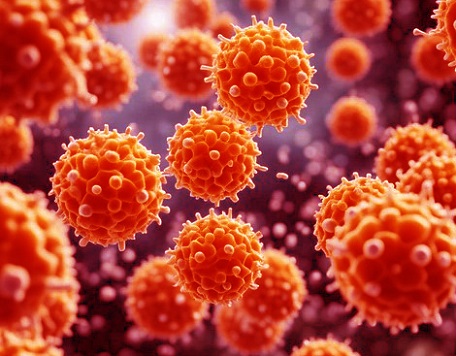Bulgarian Scientists Discover Lactobacilli Postmetabolites as Potential Anti-Herpes Agents
Nikhil Prasad Fact checked by:Thailand Medical News Team Dec 26, 2024 3 months, 3 weeks, 5 days, 12 hours, 30 minutes ago
Medical News: Herpesviruses represent a significant challenge in human and veterinary medicine. Affecting all classes of vertebrates, these highly contagious agents lead to substantial health, social, and economic losses worldwide. Current antiviral therapies primarily rely on nucleoside analogs like acyclovir, which inhibit viral DNA replication. However, these treatments often result in drug resistance, particularly in immunocompromised individuals, emphasizing the need for alternative therapeutic approaches.
 Bulgarian Scientists Discover Lactobacilli Postmetabolites as Potential Anti-Herpes Agents
Bulgarian Scientists Discover Lactobacilli Postmetabolites as Potential Anti-Herpes Agents
Lactic acid bacteria (LAB), a key component of the microbiome, are increasingly recognized for their protective roles against pathogens. Previous studies highlighted their ability to produce compounds, termed postmetabolites, with antimicrobial properties. This
Medical News report focuses on new research conducted by scientists from the Stephan Angeloff Institute of Microbiology and other Bulgarian Academy of Sciences institutions, which explores the antiviral potential of LAB-derived postmetabolites against herpesviruses.
Research Overview and Methodology
Researchers investigated nine postmetabolite products isolated from various Lactobacillus strains for their antiviral effects against herpes simplex virus-1 (HSV-1) and koi herpesvirus (KHV) in vitro. The strains were sourced from human, dairy, and environmental origins. Both cytotoxicity and antiviral assays were conducted on Madin-Darby bovine kidney (MDBK) cells and common carp brain (CCB) cells, which are permissive to viral replication.
Key experiments evaluated the postmetabolites’ ability to:
-Inhibit viral replication within cells.
-Neutralize extracellular virions.
-Block viral adsorption to host cells.
-Protect healthy cells from subsequent infection.
The results were analyzed to determine selective indices (SI), indicating the balance between cytotoxicity and antiviral activity.
Promising Results of the Study
The study revealed that most postmetabolites significantly inhibited HSV-1 and KHV across different stages of the viral life cycle. Notably, the Mix group of postmetabolites (S7, S8, and S9), derived from Ligilactobacillus salivarius, exhibited the highest efficacy. These findings demonstrate the potential of LAB-derived products as broad-spectrum antiviral agents.
-Inhibition of Viral Replication
Postmetabolites were found to disrupt viral replication effectively, particularly for HSV-1. Selective indices for the Mix group ranged from 69.4 to 77.8, indicating robust antiviral activity. In contrast, the indices for KHV were slightly lower, ranging from 62.2 to 68.4.
-Virucidal Activity
When tested against extracellular virions, the postmetabolites showed time-dependent virucidal effects. For HSV-1, samples S7, S8, and S9 redu
ced viral titers by more than 2.75 log units after 90 minutes of exposure. For KHV, the reduction was slightly weaker but still significant, with a maximum decrease of 2.0 log units.
-Blocking Viral Adsorption
The Mix group demonstrated exceptional ability to prevent viral adsorption to host cells, decreasing HSV-1 titers by up to 5.75 log units within 60 minutes. For KHV, similar trends were observed, with reductions exceeding 5.0 log units at the same time interval. Other postmetabolites also showed moderate inhibitory effects, highlighting the broad applicability of these products.
-Protective Effects on Healthy Cells
Pre-treatment of MDBK and CCB cells with postmetabolites significantly reduced the severity of subsequent herpes infections. The Mix group provided the strongest protection, reducing viral titers by more than 3.0 log units. Other samples like S3, S4, and S5 also demonstrated protective effects, albeit to a lesser extent.
Mechanisms of Action
While the exact mechanisms remain under investigation, several hypotheses explain the antiviral effects of LAB-derived postmetabolites:
-Direct Virucidal Action: Compounds such as lactic acid and hydrogen peroxide may disrupt viral particles.
-Blocking Adsorption: Certain metabolites may interfere with viral binding to host cell receptors.
-Inhibiting Replication: The postmetabolites might target specific intracellular pathways critical for viral replication.
-Immune Modulation: LAB are known to influence immune responses, potentially enhancing the body’s ability to combat viral infections.
Implications and Future Research
The findings suggest that LAB-derived postmetabolites could serve as an adjunct or alternative to conventional herpes therapies. Their broad-spectrum activity, combined with low cytotoxicity, makes them particularly attractive for further development.
Future studies should aim to:
-Identify the specific bioactive compounds within the postmetabolites.
-Elucidate detailed mechanisms of action.
-Evaluate efficacy in animal models and clinical settings.
Conclusions
This research underscores the potential of LAB-derived postmetabolites as innovative antiviral agents. Their ability to inhibit viral replication, neutralize extracellular virions, block adsorption, and protect healthy cells opens new horizons for the prevention and treatment of herpes infections. While challenges remain in translating these findings into clinical applications, the results provide a strong foundation for further exploration.
The study findings were published in the peer-reviewed International Journal of Molecular Sciences.
https://www.mdpi.com/1422-0067/26/1/74
For the latest on the Herpes Virus, keep on logging to Thailand
Medical News.
Read Also:
https://www.thailandmedical.news/news/new-approach-against-influenza-and-herpes-simplex-viruses-using-chewing-gum-infused-with-lectins
https://www.thailandmedical.news/news/herpes-simplex-virus-and-its-surprising-link-to-major-diseases-like-diabetes-and-alzheimer-s-disease
https://www.thailandmedical.news/news/oblivious-to-many-the-herpes-simplex-viruses-are-recombining-and-evolving
https://www.thailandmedical.news/news/new-study-unveils-key-mechanism-in-fighting-herpesviruses-and-mpox-virus
https://www.thailandmedical.news/news/new-insights-into-herpesvirus-protein-family-could-lead-to-new-treatments
https://www.thailandmedical.news/news/italian-study-finds-that-jujube-fruit-extracts-show-promising-potential-against-herpes-virus
https://www.thailandmedical.news/news/breakthrough-in-anti-her
